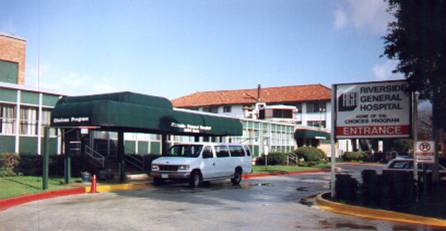
By Jeffrey L. Boney
Special to the NNPA from the Houston Forward-Times
Community leaders and activists are in an uproar and are calling on the Obama administration to release much needed funding they say is being withheld from the nation’s only functional Black hospital, Riverside General Hospital, as punishment for the proven rogue actions of one executive back in 2012.
Supporters say that if Riverside does not receive the payments that are being withheld by the federal government, they may have to close their doors in six weeks.
Riverside General Hospital, originally known as the Houston Negro Hospital, was founded in 1927 in Houston, Texas. The hospital has become a major contributor to the local communities of Greater Houston, most notably the underserved populations, for more than eighty-seven years.
Back in February 2012, Mohammad Khan was arrested and charged in a $116 million Medicare scheme that paid kickbacks to patient recruiters and personal care home owners in exchange for directing residents to Riverside’s mental health clinics.
Khan, 65, was charged and pled guilty to one count of conspiracy to commit health care fraud, one count of conspiracy to pay health care kickbacks and five other counts of paying and offering to pay kickbacks for his role in the scheme after appearing before U.S. District Judge Sim Lake. After his guilty plea, an additional $42 million in fraudulent Medicare claims were discovered, bringing the total to $158 million.
According to Khan’s plea agreement, he admitted to steering patients to Riverside from assisted living facilities and personal care homes by paying cash kickbacks to the home owners and patient recruiters in record numbers between January 2008 and February 2012. He also admitted to paying Medicare recipients with cash, cigarettes and coupons redeemable to stores operated by Riverside, in order to entice them to enroll in their programs.
Court records show that Khan oversaw the partial hospitalization programs (PHPs) at Riverside, which gave him access and the ability to commit his criminal acts. PHPs allow patients who need to take advantage of the full day programs at a psychiatric hospital or behavioral health department as opposed to checking in at an overnight hospital, to go and get the help they need. PHPs tend to have a wider range of the patients than lower levels of care and are generally covered by insurance if it is determined to be medically necessary.
During his initial court appearance, a federal health care investigator testified that records revealed Khan opened one of two personal bank accounts using the Social Security number of one of his former female neighbors who died in 1992; the same year he was hired by Riverside.
The investigator also testified that Khan’s take-home pay from Riverside was $423,809, over a five-year period and they were able to trace all but $215,473 of the money. Approximately $31.3 million of the $116 million in Medicare claims were actually paid out before the federal government started looking into the Medicare claims with more scrutiny.
Although Khan pled guilty and admitted to being the criminal mastermind behind this entire debacle, it has been Riverside General Hospital that has been treated as the criminal.
Riverside General Hospital – Copy
Riverside General Hospital has a very rich history in the Greater Houston area and is equally rich in assets also. Riverside is a community-based non-profit acute care facility that owns at least six Houston area clinics and one in Dallas, with assets totaling approximately $100 million.
In addition to Khan being indicted, six other people were also arrested by the Federal Bureau of Investigations (FBI) as part of the federal probe into Riverside by the U.S. Department of Justice, including long-time hospital administrator and chief executive officer Ernest Gibson III and his son Ernest Gibson IV.
The elder Gibson had been at Riverside for over 42 years and was primarily responsible for the growth and success of Riverside achieving the distinction as the highest rated hospital in Houston. He also helped increase the level of program success and helped the organization acquire much of their current assets over the past several decades.
Gibson III, who did not receive the same treatment as Khan or any of the other people arrested, is facing a trial date in September and adamantly maintains his innocence. Khan was arrested at his personal residence, while Gibson III had the FBI burst into the Riverside General Hospital facilities and arrest him as if he was a fugitive on the run from the law.
Gibson III was accused of wrongdoing at Riverside over 15 years ago, but he was completely exonerated and he believes he is being targeted because people want to take over the assets and operations of the last remaining Black hospital in the United States.
The origins of Riverside stretch as far back as 1918. In the early 1900s, a group of Black doctors solicited support for a new hospital to be established in Houston’s historic Third Ward with the purpose of serving patients who would otherwise never been treated elsewhere due to either financial hardships or racial reasons. Upon hearing about this need, Joseph S. Cullinan, Houston philanthropist and founder of the Texas Company, established a fund for hospital construction in 1918 in honor of his son John Halm Cullinan, a World War I casualty, and in gratitude to the Black soldiers who tended his son before he died.
The city of Houston donated land for Houston Negro Hospital and the group of doctors – Rupert O. Roett, Charles Jackson, Benjamin J. Covington, Henry E. Lee, and F. F. Stone – were able to begin development of the Houston Negro Hospital in 1925 as a result of the philanthropic donation from Cullinan. The hospital was dedicated on June 19, 1926, and officially opened in July 1927.
Houston Negro Hospital had the distinction of being the first non-profit hospital for African American patients in the city of Houston. The hospital was staffed with all Black physicians, had an all-Black board of directors and many of the first doctors employed at the hospital were exemplary leaders in medicine and in overcoming racial discrimination.
For nearly a century, Riverside General Hospital has acted as a leader in offering quality medical care for families, friends, neighbors and visitors. Fast forward to 2014, and we see Riverside is increasingly in danger of closing its doors. They are not receiving any of their federal dollars and have been downgraded to a specialty hospital, primarily because of the situation involving Khan.
According to the federal Centers for Medicare and Medicaid Services, Texas, Louisiana and Florida, which generate 76 percent of all PHP claims to Medicare, are well-known as high-fraud areas. However, there appears to be a different standard applied to hospitals run by African Americans and those who primarily serve the African American community, than other hospitals facing similar circumstance in the state of Texas and in our nation.
Westbury Community Hospital, which is located in southwest Houston, filed bankruptcy and was on the brink of having their doors closed because they were experiencing ongoing financial problems after federal agents seized records as part of a Medicare fraud investigation into financial exploitation and care of the mentally ill in April 2012. The money Westbury received from the federal government had run dry after federal officials ruled the hospital was treating “incarcerated” patients; a claim Westbury disputed.
Attorney Lynn Butler, who represented John Lange, the court-appointed bankruptcy trustee for Westbury Community Hospital, told U.S. District Judge Lynn Hughes and Bankruptcy Judge Marvin Isgur that Lange and the Centers for Medicare & Medicaid Services, which reimburses health care facilities for care of the poor, disabled and elderly, had come to an agreement over more than $400,000 that the agency owes the hospital. No one affiliated with Westbury Community Hospital had been charged with a crime when this brokered agreement was made.
Unlike Riverside, Westbury Community Hospital was allowed to have their federal funding restored and stayed open after an agreement was brokered between the hospital’s trustee and the federal government. Community leaders and activists are hoping the federal government provides the same equitable treatment to Riverside that it gave to Westbury Community Hospital.
Riverside General Hospital is extremely important to the African American community, especially in the areas of medical care and the treatment of drug addiction.
They are calling on President Obama and his administration to acknowledge the current and historical relevance of this institution to the African American community and to immediately release their much needed funds so they can continue the good work they do in the community.
They are also encouraging the Obama administration to work with Riverside General Hospital in order to allow them to make the necessary adjustments to implement the proper infrastructure to prevent future financial losses.


